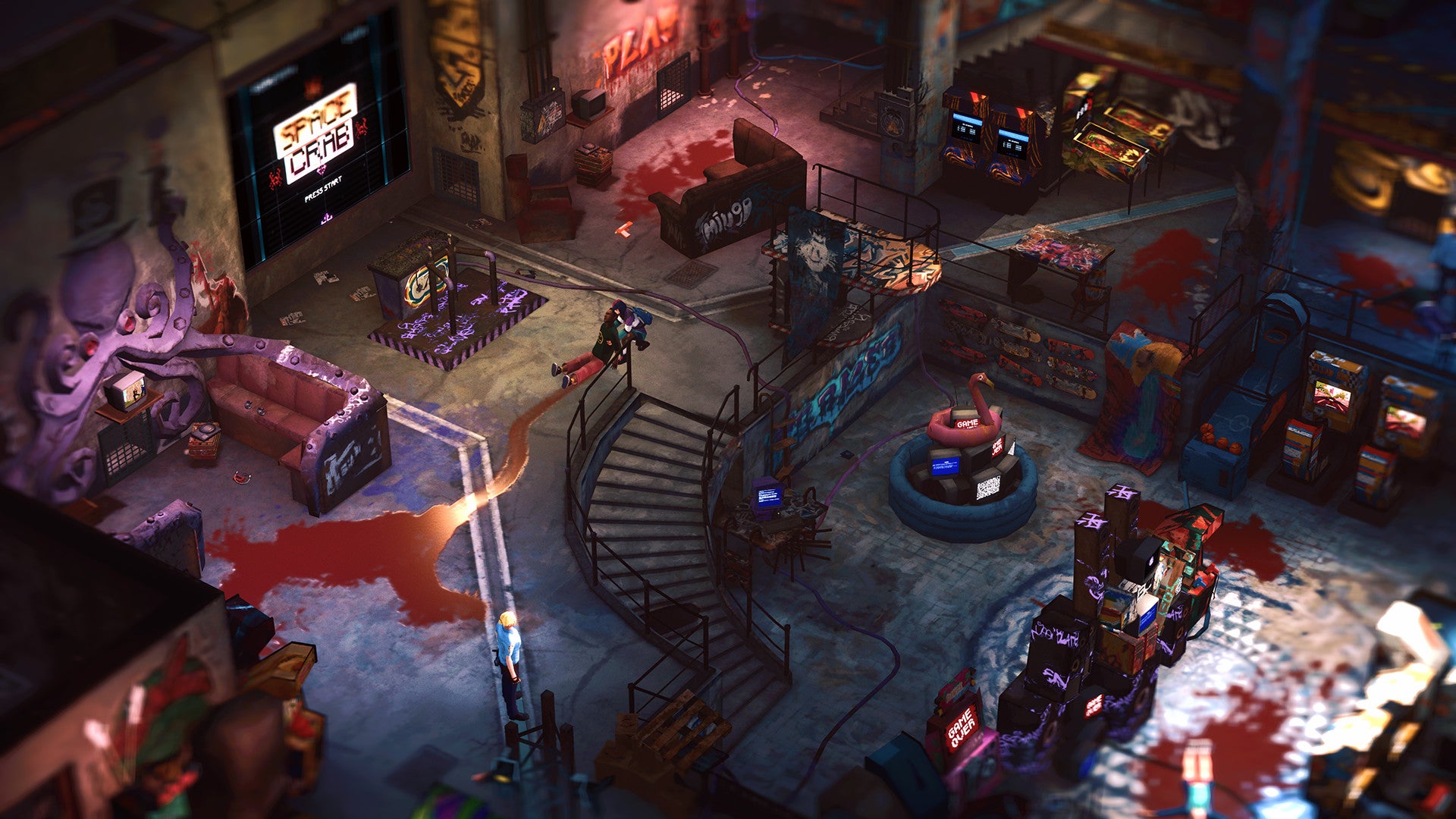Serial Cleaners sees you alternate between four different disposers who work for the mob: a criminal organisation that does a lot of murder. It’s New Year’s eve, 1999, and the squad reminisces about the old days, like how they met and the biggest jobs they’d ever pulled off. You’ve got Bob, the jaded mentor who returns from the first game; Psycho, the tropey disturbed one; Lati, a speedy parkour enthusiast; and Vip3r (with a three in her name, yes), a hacker who says things like “leet” and “TTYI” and it makes me want to sink into the earth with embarrassment. The game’s characters are an interesting enough bunch whose disposal missions carry different contexts depending on their background. Bob can’t seem to escape from the mob and its cocaine-fuelled parties, no matter how much it matters to his ailing mum, while Vip3r keeps tabs on crime through her secretive online channels and races to hide their mess. Sometimes it’s a bit difficult to keep up with what’s actually going on, especially as most context is displayed in a brief paragraph at the bottom of a loading screen and isn’t explained in detail in-person; not to mention that you’re bouncing between four different folks on a regular basis. Yet, these issues are counterbalanced by some interesting flashback sequences which delve a little more into their troubled personal histories. And once you’re embroiled in the art of disposal, it’s easy to forgive the game’s jagged story beats. Each mission has a set number of objectives to tick off and there’s rarely any deviance from the formula: you must dispose of some bodies, dump pocketable or more substantial evidence, and hoover up enough blood to satisfy the boss. Of course, it’s each character’s ability to go about these tasks with differing levels of panache that keeps things interesting. As Bob you’re able to wrap up bodies, ensuring that they won’t leave a blood trail when dragged along the ground and slide on blood trails for a quick getaway. As Vip3r you’re able to hack into terminals and remotely open doors, switch off lights, and create other various distractions. Psycho is perhaps the most amusing of the bunch, as you can chop bodies to bits with a chainsaw, breaking them into limbs which can be more easily transported but come with the tradeoff that there’s, well, more of them. And as Psycho, you can chuck objects at unsuspecting guards to knock them unconscious. Even the sight of you chopping up a body will cause a guard to faint, which can be used to your advantage in some hilariously gruesome ways. Really, though, it’s Lati who’s the best of the bunch. She’s able to hop over low fences, climb guttering, and generally flit around the map like it’s some parkour paradise. Sure, it might sound like the simplest of abilities, but it suits the game’s sensibilities to a tee. Where others may have to rely on nabbing keys and stalking corridors, playing as Lati means you’re able to exploit the game’s architecture and outfox the AI with your superior athletic ability. And once you’ve clocked all the various routes you can take, Lati’s ability to fly across maps makes for a body disposal feeling I can only describe as some sort of flow state – it’s weirdly, horribly, wonderful. The game rewards clean and precise cleaning as well as chaotic clumsiness, which means that you never feel like you’re being punished when those calculated maneuvers devolve into manic sprints. Much like a simple immersive sim, the game accommodates for creativity or downright panic, so you feel like you’re either in, or able to wrest back control at the flip of a door or a slip into conveniently placed wardrobe. Some of the game’s best moments emerge from accidents, like when I opened a door into a guard and knocked them unconscious, or when I lobbed a limb towards a woodchipper in the hopes I’d mulch it out of existence and ended up clocking a police offer square in the jaw. While there is an element of repetitiveness to missions - as each ultimately requires of you the same service - the game does its best to throw some curveballs into the mix. I can’t speak about these in detail, but two cleaners may help each other out or parties may inhibit your ability to see clearly. But you’re never thrust into a situation that feels desperately unfair, as the layout of the levels and their hidey holes are often just the right amount of forgiving. Plus, you’ve got this slow-mo ability that zooms out and highlights enemies and points of interest if you’re ever in need of some direction. And Serial Cleaners has a relatively quick runtime, made up of a few chapters that conclude things before it outstays its welcome. While an array of cleaners and strong level design can’t quite turn the game into a devour-in-one-sitting affair, it’s still a burst of stressful fun and an anecdote generator if you’re either a chaotic cleaner or more methodical with the hoover.

